As noted here previously, on November 24th the Press Gazette reported the response of the BBC’s Executive Complaints Unit (ECU) to complaints submitted on the topic of the corporation’s coverage of the explosion at Al Ahli hospital in the Gaza Strip on October 17th.
“The BBC has not upheld complaints about its coverage of the Israel-Hamas war brought by the Board of Deputies of British Jews and the Campaign Against Antisemitism.
Law firm Mishcon de Reya acted on behalf of the groups and the complaints were fast-tracked by director-general Tim Davie after widespread criticism of the broadcaster, including its decision not to refer to Hamas as “terrorists”.
The BBC’s executive complaints unit (ECU) did find that coverage of a hospital blast in Gaza was “not consistent” with its “standards of due accuracy” but this part of the complaint was resolved rather than upheld because the broadcaster had already posted a clarification online.”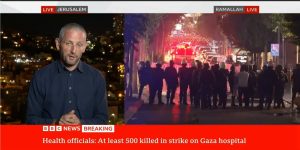
That October 19th clarification concerned the televised report by Jon Donnison aired two days earlier in which he told viewers that:
“The Israeli military […] have said that they are investigating. But, you know, it is hard to see what else this could be, really – given the size of the explosion – other than an Israeli airstrike or several airstrikes…ah…because, you know, when we’ve seen rockets being fired out of Gaza, we never see explosions of this scale. We might see half a dozen – maybe a few more – people being killed in such rocket attacks but we’ve never seen anything on the scale of the sort of explosion on the video I was watching…”
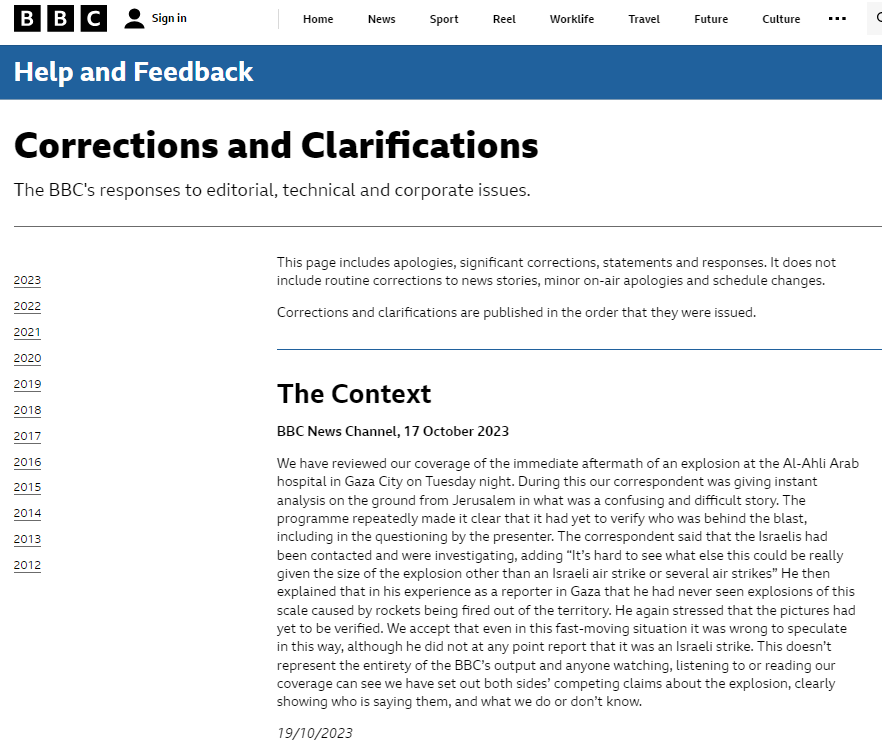
The Press Gazette also reported the ECU’s findings concerning the part of the complaints relating to posts put out on BBC social media accounts.
“The complaints also referred to a BBC News push alert and a post on the BBC Breaking News X (Twitter) account at around 6.25pm and 6.51pm respectively on the same evening with almost identical wording. The X post said: “Hundreds feared dead or injured in Israeli air strike on hospital in Gaza, Palestinian official says.”
The ECU noted that the BBC “cannot yet establish as fact who was responsible for the blast”, citing BBC Verify reporting. Other sources, including the complainants and the Associated Press, believe the explosion was “likely caused by a rocket launched from within Gaza that misfired”.
It said it therefore had “no grounds for concluding” the posts were inaccurate.”
The ECU’s explanation of its ruling on that part of the complaints as “not upheld” includes the following: [emphasis added]
“The complaint about items 1,2 and 3 was on the basis that they erroneously suggested Israeli responsibility for the blast, whereas it had been caused by “a failed rocket fired by a terrorist organisation in Gaza”. For the reasons set out in analyses by BBC Verify at https://www.bbc.co.uk/news/world-middle-east-67144061 and https://www.bbc.co.uk/news/world-middle-east-67216929, the BBC cannot yet establish as fact who was responsible for the blast.”
Those two reports by BBC Verify were discussed – along with another one – here earlier:
REVIEWING BBC VERIFY REPORTING ON THE AL AHLI HOSPITAL INCIDENT
As we noted at the time, the writers of the first report – published on October 19th – “were however unable to inform BBC audiences what caused the explosion and instead preferred to promote the notion of equal validity of a “claim” from a proscribed terrorist organisation and a “counterclaim” from the IDF.”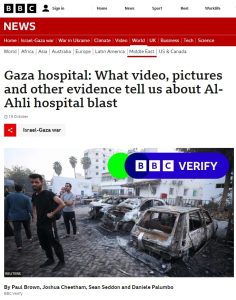
The writers of the second BBC Verify report – published on October 26th – relied on some dubious sources in order to frame the cause of the incident as “still contested”: [emphasis added]
“It [the report] does however promote claims made by a former ‘Human Rights Watch’ employee with a record of producing anti-Israel reports concerning events in the Gaza Strip and a highly problematic hobby:
“Former UN war crimes investigator Marc Garlasco tweeted: “In 20 years of investigating war crimes this is the first time I haven’t seen any weapon remnants. And I’ve worked three wars in Gaza.” […]
However, Mr Garlasco said he believed the footage was consistent with an Iron Dome interception.”
In addition, BBC Verify chose to amplify – and link to – statements from the political NGO ‘Forensic Architecture’ without clarification of that organisation’s record on Israel and without mentioning the fact that its ‘analysis’ was conducted together with another political NGO – Al Haq – which is linked to a terrorist organisation and hence designated by Israel.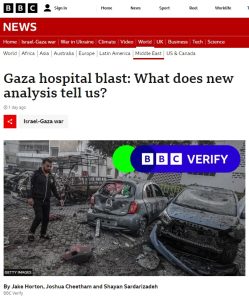
“The Forensic Architecture agency, a UK-based organisation which investigates human rights abuses, has carried out its own analysis of the crater, and suggests it is more consistent with the impact marks from an artillery shell which it concludes came from the direction of Israel.
It says that the scarring patterns above the crater are consistent with the shrapnel damage that would be expected from an artillery strike.”
If BBC Verify cannot even do the basic required background research on the sources it quotes and promotes and their records of political activism, then clearly its declared purpose of countering disinformation does not serve the interests of BBC audiences. For example, the use of the term ‘IOF’ – i.e. ‘Israel Occupation Forces’: a term only used by anti-Israel activists – in the Forensic Architecture tweet promoted in this report should have been enough evidence of the partiality of that organisation for BBC Verify to refrain from amplifying its ‘analysis’.”
When the BBC launched its BBC Verify brand in May of this year it described it as follows:
“BBC News has unveiled BBC Verify – a new brand to address the growing threat of disinformation and build trust with audiences by transparently showing how BBC journalists know the information they are reporting.
BBC Verify will showcase the advanced editorial tools and techniques BBC news journalists are using to investigate, source and verify information, video, and images.”
To date, much of the BBC Verify ‘fact checking’ relating to the current war between Israel and Hamas has been less than impressive.
However, in addition to combating disinformation and fact-checking, BBC Verify apparently also functions as a short-cut for the dismissal of complaints relating to BBC content. What we now see is the BBC’s Executive Complaints Unit rejecting complaints relating to BBC output on the basis of other content produced by the BBC itself.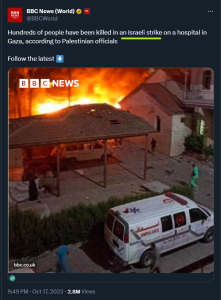
While the BBC of course has no proof whatsoever that the October 17th explosion at Al Ahli hospital was the result of Israeli actions, it continues to frame that as a possibility by presenting the circumstances as ‘disputed’ or ‘contested’. Together with the ECU’s latest claim that “the BBC cannot yet establish as fact who was responsible for the blast” (which, frankly, does not explain why it nevertheless refuses to take down Tweets referring to “an Israeli airstrike“), that raises the very serious question of what that chosen editorial stance is intended to achieve.
To many members of the public, it seems sadly clear that the BBC is more interested in trying to deflect criticism and complaints concerning its coverage than in providing its audiences with accurate, impartial and informative reporting.
Related Articles:
BBC RESPONSES TO CRITICISM OF COVERAGE OF THE AL AHLI EXPLOSION – PART ONE
WHY BBC REPORTING ON THE AL AHLI HOSPITAL INCIDENT SHOULD NOT SURPRISE
BBC EFFORTS TO DAMP DOWN CRITICISM DO NOT ADDRESS THE REAL ISSUES
REVIEWING BBC VERIFY REPORTING ON THE AL AHLI HOSPITAL INCIDENT

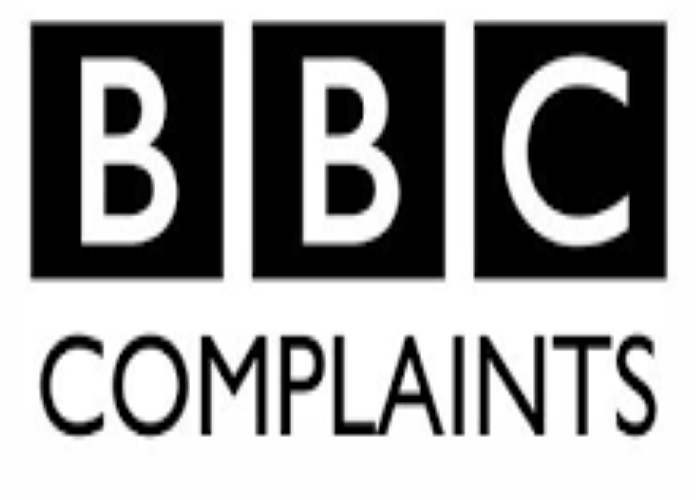


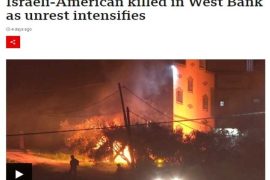

You cannot hope
to bribe or twist,
thank God! the
British journalist.
But, seeing what
the man will do
unbribed, there’s
no occasion to. (Humbert Wolfe, 1930)
As I mentioned previously the new department was named incorrectly it should have been called BBC UNverify #defundthebbc